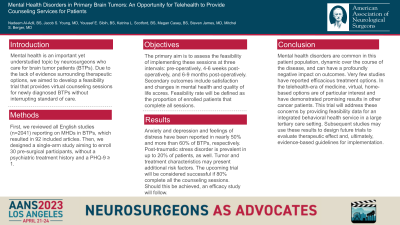Mental Health Disorders in Primary Brain Tumors: An Opportunity for Telehealth to Provide Counseling Services for Patients
Friday, April 21, 2023


Nadeem Al-Adli, BS
Medical Student
Department of Neurological Surgery, University of California San Francisco
San Francisco, California, United States
Presenting Author(s)
Introduction: Mental health is an important yet understudied topic by neurosurgeons who care for brain tumor patients (BTPs). Due to the lack of evidence surrounding therapeutic options, we aimed to develop a feasibility trial that provides virtual counseling sessions for newly diagnosed BTPs without interrupting standard of care.
Methods: First, we reviewed all English studies (n=2041) reporting on MHDs in BTPs, which resulted in 92 included articles. Then, we designed a single-arm study aiming to enroll 30 pre-surgical participants, without a psychiatric treatment history and a PHQ-9 ≥ 1. The primary aim is to assess the feasibility of implementing these sessions at three intervals: pre-operatively, 4-6 weeks post-operatively, and 6-9 months post-operatively. Secondary outcomes include satisfaction and changes in mental health and quality of life scores. Feasibility rate will be defined as the proportion of enrolled patients that complete all sessions.
Results: Anxiety and depression and feelings of distress have been reported in nearly 50% and more than 60% of BTPs, respectively. Post-traumatic stress disorder is prevalent in up to 20% of patients, as well. Tumor and treatment characteristics may present additional risk factors. The upcoming trial will be considered successful if 80% complete all the counseling sessions. Should this be achieved, an efficacy study will follow.
Conclusion : Mental health disorders are common in this patient population, dynamic over the course of the disease, and can have a profoundly negative impact on outcomes. Very few studies have reported efficacious treatment options. In the telehealth-era of medicine, virtual, home-based options are of particular interest and have demonstrated promising results in other cancer patients. This trial will address these concerns by providing feasibility data for an integrated behavioral health service in a large tertiary care setting. Subsequent studies may use these results to design future trials to evaluate therapeutic effect and, ultimately, evidence-based guidelines for implementation.
Methods: First, we reviewed all English studies (n=2041) reporting on MHDs in BTPs, which resulted in 92 included articles. Then, we designed a single-arm study aiming to enroll 30 pre-surgical participants, without a psychiatric treatment history and a PHQ-9 ≥ 1. The primary aim is to assess the feasibility of implementing these sessions at three intervals: pre-operatively, 4-6 weeks post-operatively, and 6-9 months post-operatively. Secondary outcomes include satisfaction and changes in mental health and quality of life scores. Feasibility rate will be defined as the proportion of enrolled patients that complete all sessions.
Results: Anxiety and depression and feelings of distress have been reported in nearly 50% and more than 60% of BTPs, respectively. Post-traumatic stress disorder is prevalent in up to 20% of patients, as well. Tumor and treatment characteristics may present additional risk factors. The upcoming trial will be considered successful if 80% complete all the counseling sessions. Should this be achieved, an efficacy study will follow.
Conclusion : Mental health disorders are common in this patient population, dynamic over the course of the disease, and can have a profoundly negative impact on outcomes. Very few studies have reported efficacious treatment options. In the telehealth-era of medicine, virtual, home-based options are of particular interest and have demonstrated promising results in other cancer patients. This trial will address these concerns by providing feasibility data for an integrated behavioral health service in a large tertiary care setting. Subsequent studies may use these results to design future trials to evaluate therapeutic effect and, ultimately, evidence-based guidelines for implementation.
